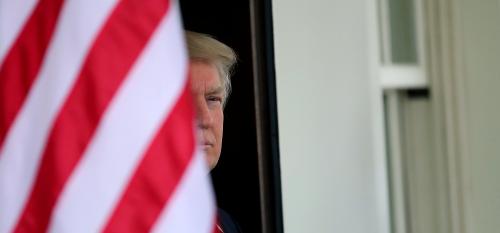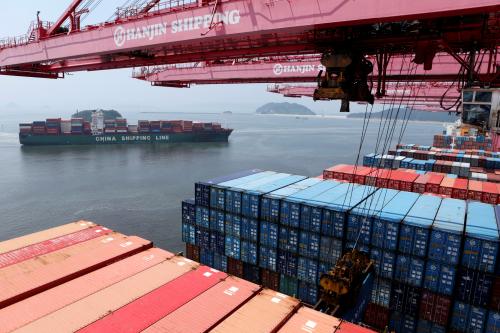Content from the Brookings-Tsinghua Public Policy Center is now archived. Since October 1, 2020, Brookings has maintained a limited partnership with Tsinghua University School of Public Policy and Management that is intended to facilitate jointly organized dialogues, meetings, and/or events.
From November 3 to 14, Donald Trump will visit Japan, South Korea, Vietnam, the Philippines, and China. What can the Trump administration accomplish that would effectively address its priorities? What’s the likelihood of a significant breakthrough on trade, market access, or North Korean denuclearization? What can Trump’s team do to give the U.S. a legitimate “win”? David Dollar provides his take below, in a piece that was originally published on ChinaFile.
China’s strategy will be to roll out the red carpet for President Trump and to show him great respect, while offering little or nothing in the trade arena. Economists generally do not care about bilateral imbalances, but Trump has made a big deal of the U.S. bilateral deficit with China. The deficit has grown 6 percent this year and will continue to rise, especially if there is a tax cut. The real issue for U.S.-China is not the bilateral imbalance but rather China’s market access restrictions. Important products such as autos face a 25 percent import tariff. More important are the investment restrictions in a wide range of manufacturing and services industries. In services in particular, it is difficult for U.S. firms to sell into the China market if they cannot invest there. Firms are limited by restrictions in finance, telecom, logistics, entertainment, and social media.
The state visit to China comes at an inopportune time, too soon after the 19th Party Congress for China to have any significant opening moves in the works. President Xi will tell Trump that China is planning to open up more sectors, but there are unlikely to be any details or commitments. Best case is that China is ready to open a couple of markets such as investment banking and insurance as a signal that it is serious. The timing of the visit is also inopportune in the sense that the U.S. is carrying out a major 301 investigation of unfair trade practices. Some months down the road, the administration will have the results. China is unlikely to make any major changes in response to the investigation. Chinese exports to the U.S., in value added terms, have declined to about 3 percent of its economy, from 6 percent just a few years ago. Access to the U.S. market is useful for China but not as important as in the past. Hence, China is unlikely to give in to threats. The administration will then have to decide if it wants to take some tough protectionist measures, to which China is likely to respond.
China is betting that keeping up the friendly talk will reduce the likelihood of harsh U.S. protection down the road. China is also lining up a set of import and investment deals. In general, these transactions were going to happen anyway and do not signify a shift in Chinese policy. But the administration may be happy to showcase some of them as evidence that the relationship is improving.
Trump will continue on from China to the APEC meeting in Vietnam where he will give a speech on the free and open Indo-Pacific Region. The TPP11 may be prepared to announce a trade agreement in principle without the U.S. China will no doubt reiterate its vast financial commitment to building infrastructure along the Belt and Road. There is a risk that the United States has nothing of substance to contribute to the economic architecture of the Asia-Pacific.






Commentary
As Trump heads to China, don’t expect major announcements on trade
November 6, 2017